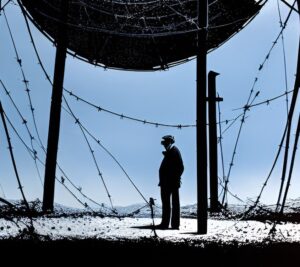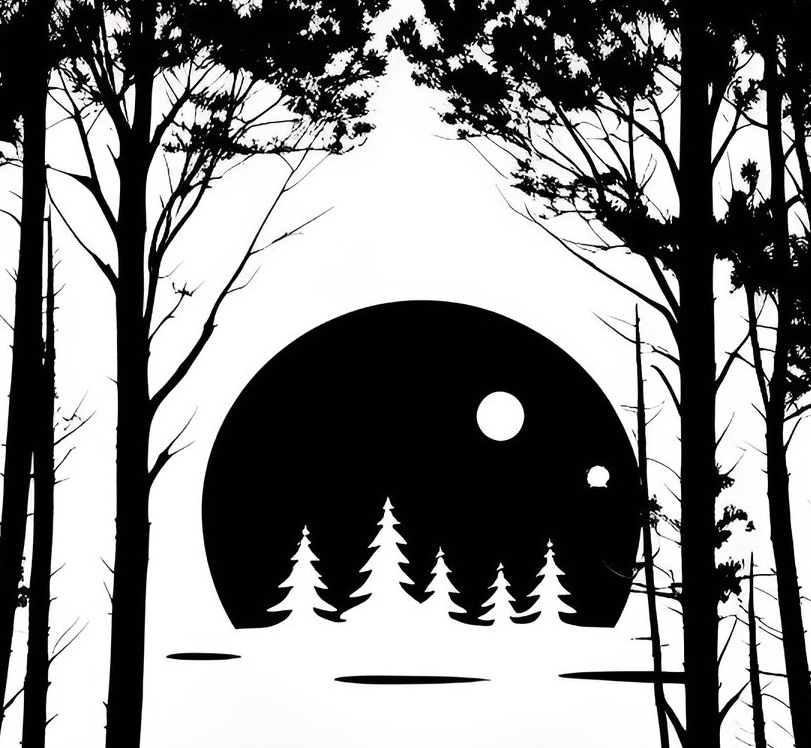A Far Away Planet to Which I Would Never Return — The vanishing horizon line of Terrence Malick‘s BADLANDS: “Kit is a trash collector by trade, Batailling against the solar surpluses reclaimable in the culturubble, throwing away items of no-to-low utility, revealing how even The Outsider can only seek emancipation from materialism in refuse materials, much as turning one’s back on the they involves turning one’s back in the way the they have always turned their backs. A character of never dwelling anywhere, curiosity is everywhere and nowhere for Kit, whose horizon is informed by the seem outlaw possibilities the filmic frame presents those of us Landlocked out of the American scheme. Now alienated from dreaming even our own dreams, our horizon is the rearward-leaking retrochronic echo wave of a celluloid reference point from still-real 1973.”
Gold and Glory in Times of Thought-Chaos: “Securing and maintaining wealth is not complicated. It’s a matter of the soul. You need to be clear in yourself.”
Is the Psychedelic Industrial Complex Evil? “The current psychedelic landscape is greatly influenced by Carl Jung, whose acolyte Stanislav Grof administered LSD in more than 5,000 sessions in communist Czechoslovakia. Yet Jung was famously suspicious of what he called ‘the pure gifts of the Gods,’ described and promoted by early ‘psychonauts’ such as Osmond and Huxley. More than anything, Jung suggests, we ought to engage with the psyche on its own terms, as a mysterious and subterranean layer of reality that can’t necessarily be gauged in the terms of Reason that govern our everyday lives.”

Noblesse Oblige — Death & Rebirth: “The modern oligarch seeks to purchase indulgences through philanthropy, establishing ‘foundations’ and launching ‘initiatives’ to make the world run more efficiently. But this is the exact opposite of noblesse oblige. True noblesse oblige never promotes itself the way billionaires promote their philanthropy, hiring journalists and PR firms to laud them, while also taking massive tax breaks for their trouble. ‘Virtuous acts are noble,’ writes Aristotle, ‘and are done for the sake of that which is noble. The liberal man, therefore, like the others, will give with a view to, or for the sake of, that which is noble, and give rightly.’ Oligarchic philanthropy, therefore, is at best a questionable caricature of it.”
Patience With What Is Strange: In Praise Of Slow Art: “Slow art has layers. And this is why it requires time and effort. We should see this as a good and necessary thing. If this is a kind of obstacle in the way of easy assimilation then it is an obstacle that is integral to the value of the thing itself. The mind is calmed, or disturbed, or made exultant by the art that rewards us for our goodwill and our capacity to take our time. As Nietzsche says – and I cannot resist giving this great aphorism in full, as it may be one of the very best things he ever wrote:
One must learn to love.— This is what happens to us in music: first one has to learn to hear a figure and melody at all, to detect and distinguish it, to isolate it and delimit it as a separate life; then it requires some exertion and good will to tolerate it in spite of its strangeness, to be patient with its appearance and expression, and kindhearted about its oddity:—finally there comes a moment when we are used to it, when we wait for it, when we sense that we should miss it if it were missing: and now it continues to compel and enchant us relentlessly until we have become its humble and enraptured lovers who desire nothing better from the world than it and only it.— But that is what happens to us not only in music: that is how we have learned to love all things that we now love. In the end we are always rewarded for our good will, our patience, fair mindedness, and gentleness with what is strange; gradually, it sheds its veil and turns out to be a new and indescribable beauty:—that is its thanks for our hospitality. Even those who love themselves will have learned it in this way: for there is no other way. Love, too, has to be learned.”
We Must Become Barbarians: “Shatter zones do not have to literally be in the hills: they can be within our homes and even within our hearts. My heart soars whenever I hear of some remote monastery or surviving rooted community with no online access or even electricity, whose people know exactly where they stand: outside the state, the better to see God and experience creation. Such places are the work of the raw barbarians, and we need more of them.”
